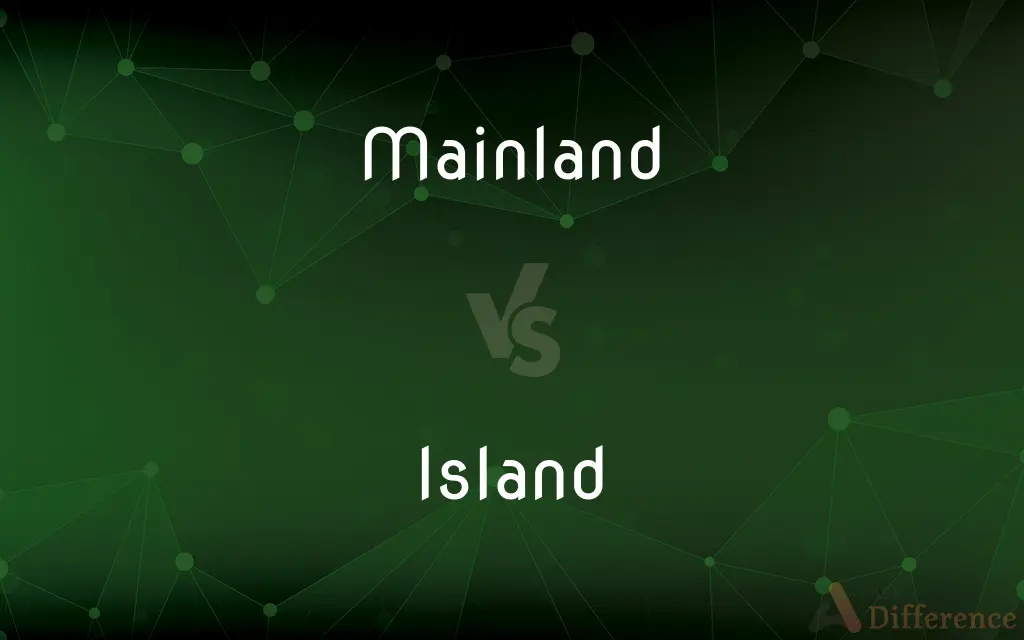Mainland vs. Island — What's the Difference?
By Tayyaba Rehman & Fiza Rafique — Published on September 20, 2023
Mainland refers to a large mass of land that forms the principal territory of a country, while an island is a landmass surrounded by water.

Difference Between Mainland and Island
Table of Contents
ADVERTISEMENT
Key Differences
The term "mainland" is used to describe a primary landmass, often the largest part of a country or continent. An "island," in contrast, is a landmass that is entirely surrounded by water. The mainland is typically contiguous and expansive, often housing the majority of a nation's population and resources. Islands can be large or small but are defined by their isolation from larger landmasses.
Mainland areas are generally better connected in terms of infrastructure like roads, bridges, and communication networks. Islands, however, might lack such comprehensive facilities due to their separated nature and sometimes limited resources. While the mainland usually has multiple points of access by land, an island's primary points of access are by air or sea.
Climate and ecology also vary between the mainland and islands. The mainland often has a more diverse range of climates and ecosystems due to its larger size. Islands might have unique, specialized ecosystems but are generally more limited in climatic diversity. Both the mainland and islands have their own natural and cultural heritage, but the latter often possesses a distinct identity shaped by its geographical isolation.
In summary, the mainland is the principal, often largest, landmass in a country or continent and is usually well-connected and resource-rich. An island is a landmass surrounded by water, often with limited points of access and a unique ecosystem.
Comparison Chart
Definition
Principal, often largest, landmass
Landmass entirely surrounded by water
ADVERTISEMENT
Accessibility
Multiple points of access by land
Access mainly by air or sea
Infrastructure
Well-developed
May lack comprehensive facilities
Ecosystem
Diverse climate and ecology
Limited, often unique, ecosystems
Cultural Identity
Usually a mix, influenced by size
Distinct, shaped by geographical isolation
Compare with Definitions
Mainland
Principal Territory: "The mainland is the principal landmass of a country."
Most of the population lives on the mainland.
Island
Surrounded by Water: "An island is a landmass surrounded entirely by water."
The island is accessible only by boat or plane.
Mainland
Diverse Ecology: "Mainland areas often have a diverse range of ecosystems."
The mainland has both deserts and forests.
Island
Isolated: "Islands are often isolated from larger landmasses."
The island has a unique culture due to its isolation.
Mainland
Resource-Rich: "The mainland is usually abundant in resources."
The mainland is rich in minerals and fertile land.
Island
Geographically Distinct: "An island is geographically separated from the mainland."
The island has its own climate zones distinct from the mainland.
Mainland
Continuity: "The mainland is usually contiguous and expansive."
The mainland stretches across thousands of miles.
Island
Limited Access: "Islands usually have limited points of entry."
The only way to reach the island is by ferry.
Mainland
Well-Connected: "The mainland often has extensive infrastructure."
The mainland is crisscrossed by highways and railways.
Island
Unique Ecosystems: "Islands often have specialized, unique ecosystems."
The island is home to several endangered species.
Mainland
A major landmass especially when considered in relation to nearby islands or attached peninsulas.
Island
Abbr. Isl. or Is. or I. A landmass, especially one smaller than a continent, entirely surrounded by water.
Mainland
The continent; the principal land, as distinguished from islands or a peninsula.
Island
An unattached kitchen counter providing easy access from all sides.
Mainland
The principal island of a group.
Island
A raised curbed area, often used to delineate rows of parking spaces or lanes of traffic.
Mainland
The continent; the principal land; - opposed to island, or peninsula.
After the two wayfarers had crossed from the peninsula to the mainland.
Island
The superstructure of a ship, especially an aircraft carrier.
Mainland
The main land mass of a country or continent; as distinguished from an island or peninsula
Island
(Anatomy) A cluster of cells differing in structure or function from the cells constituting the surrounding tissue.
Island
To make into or as if into an island; insulate
A secluded mansion, islanded by shrubbery and fences.
Island
A contiguous area of land, smaller than a continent, totally surrounded by water.
Island
(by extension, in place names) A contiguous area of land, smaller than a continent, partially surrounded by water; A peninsula; A half-island.
Despite its name, Barry Island is actually a peninsula
Island
An entity surrounded by other entities that are very different from itself.
An island of colors on a butterfly's wing
Island
A superstructure on an aircraft carrier's deck.
Island
A traffic island.
The island in the middle of a roundabout
Island
(by extension, West Midlands dialect) A roundabout; A traffic circle.
Dunton island, near Birmingham, is one of the most confusingly labelled islands in the U.K.
In Coventry, you will often hear people say: “Turn right at the island”.
Island
A bench, counter, etc., that is not connected to a wall or other furniture and which can be used from any side.
Island
(government) An unincorporated area wholly surrounded by one or more incorporated areas.
Island
(grammar) A phrase from which a wh-word cannot be extracted without yielding invalid grammar.
Island
(transitive) To surround with water; make into an island.
Island
(transitive) To set, dot (as if) with islands.
Island
(transitive) To isolate.
Island
A tract of land surrounded by water, and smaller than a continent. Cf. Continent.
Island
Anything regarded as resembling an island; as, an island of ice.
Island
To cause to become or to resemble an island; to make an island or islands of; to isle.
Island
To furnish with an island or with islands; as, to island the deep.
Island
A land mass (smaller than a continent) that is surrounded by water
Island
A zone or area resembling an island
Common Curiosities
What is Mainland?
Mainland is the primary and often largest landmass of a country or continent.
How do you Access the Mainland?
The mainland is usually accessible by multiple land routes.
How is Mainland Different from an Island?
Mainland is contiguous and often larger, while an island is isolated and surrounded by water.
How do you Access an Island?
Islands are generally accessed by boat, ferry, or airplane.
What Kind of Infrastructure Does an Island Have?
Islands may lack comprehensive infrastructure due to their isolated nature.
Is Mainland Always Bigger than an Island?
Not necessarily, but the mainland is often the largest part of a country.
What Kind of Infrastructure Does the Mainland Have?
Mainland often has well-developed infrastructure like roads, railways, and airports.
What is an Island?
An island is a landmass entirely surrounded by water.
Does Mainland Have a Diverse Ecosystem?
Yes, the mainland often has a diverse range of ecosystems.
Is it Easier to Travel within the Mainland?
Generally, yes, because the mainland is often well-connected by various modes of transport.
Does an Island Have a Diverse Ecosystem?
Islands often have specialized, but more limited, ecosystems.
What are the Economic Opportunities on the Mainland?
The mainland usually offers a wide range of economic opportunities due to its size and resources.
Is the Culture Different on an Island vs. Mainland?
Islands often have distinct cultures shaped by their geographical isolation.
What are the Economic Opportunities on an Island?
Economic opportunities on islands may be more limited and often include tourism and fishing.
Is it Easier to Travel within an Island?
Travel within an island depends on its size and available infrastructure, but it's usually more limited.
Share Your Discovery

Previous Comparison
Consequently vs. Eventually
Next Comparison
Migrant vs. RefugeeAuthor Spotlight
Written by
Tayyaba RehmanTayyaba Rehman is a distinguished writer, currently serving as a primary contributor to askdifference.com. As a researcher in semantics and etymology, Tayyaba's passion for the complexity of languages and their distinctions has found a perfect home on the platform. Tayyaba delves into the intricacies of language, distinguishing between commonly confused words and phrases, thereby providing clarity for readers worldwide.
Co-written by
Fiza RafiqueFiza Rafique is a skilled content writer at AskDifference.com, where she meticulously refines and enhances written pieces. Drawing from her vast editorial expertise, Fiza ensures clarity, accuracy, and precision in every article. Passionate about language, she continually seeks to elevate the quality of content for readers worldwide.
















































